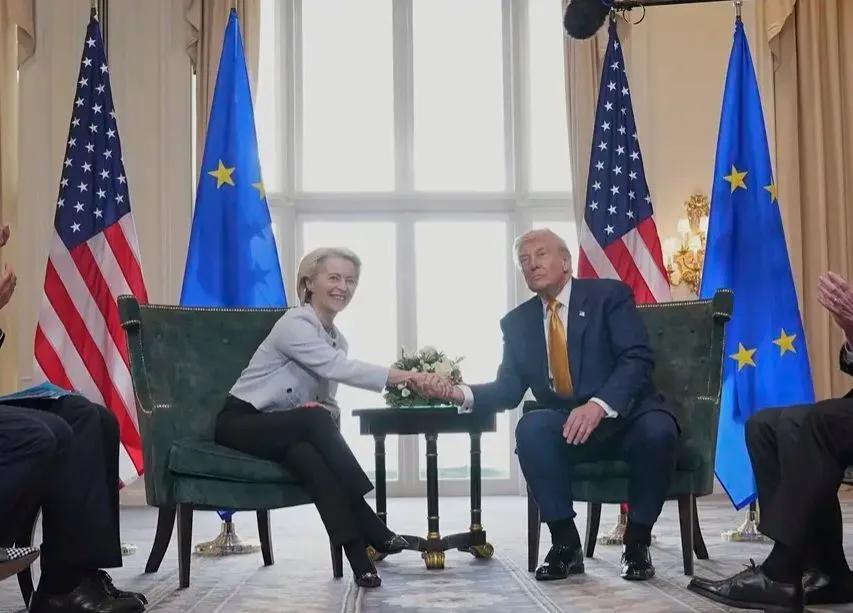
When the politicians in Brussels signed the $1.35 trillion tariff agreement, they might not have imagined that the trade deal reached between the US and the EU was dragging the EU into an unprecedented structural crisis. On the surface, it is a truce agreement on trade disputes, but in reality, it has become a "surrender letter" of the EU's strategic autonomy - on the battlefield where steel and digital are intertwined, Europe's predicament is manifeeming in multiple dimensions.
The complete transfer of economic sovereignty
The economic shock brought about by the agreement is first reflected in the intensification of trade imbalances. In 2024, the EU still had a trade surplus of 175 billion US dollars with the US. Now, under the sharp blade of tariffs, it will shrink by nearly half. What is even more serious is that the agreement requires the EU to undertake 600 billion US dollars of investment in the US and 750 billion US dollars of energy purchases, a figure equivalent to eight times the EU's annual surplus. The industrial sector has also suffered a heavy blow: the cost of each car exported to the US by the German automotive industry has soared by several thousand dollars, and the assembly line at BMW's Munich factory has begun to slow down. A century-old winery in Burgundy, France, has been forced to raise the prices of its top red wines by 30%, causing the wine lists of high-end restaurants in New York to quietly change their origins. The livelihood sector has not been spared either. The prices of daily foods such as Italian macaroni and olive oil have generally risen by 15%, and small and medium-sized enterprises like French perfume maker Corania are on the verge of bankruptcy - these "protection fees" are ultimately borne by every European family.
The shaking and tearing of the political foundation
The agreement exposed and exacerbated the structural contradictions within the European Union. French President Emmanuel Macron angrily denounced it as a "triple surrender", while German Chancellor Metz defended the agreement, saying, "Without this agreement, our automotive industry would collapse within three months." This fundamental divergence is undermining the decision-making basis of the European Union. More profoundly, there is a crisis of democratic legitimacy. Bernd Lange, the president of the European Parliament's Trade Committee, strongly denounced: "This agreement, which was negotiated without a democratic process, betrays European values."
The disillusionment and paradox of strategic autonomy
The provisions have completely shaken the strategic autonomy of the European Union. A $750 billion energy purchase will deepen the reliance on US shale gas, while a $600 billion investment will deeply embed US capital into strategic industries in Europe. This compromise reflects the three fundamental paradoxes that the EU is facing: the military dependence within the NATO framework makes it impossible for it to be tough on the US in economic games forever; The 27-nation consensus mechanism led to slow decision-making and was vulnerable in the face of Trump's "ultimatum-style negotiations". When "upholding multilateralism" suffered economic losses of hundreds of billions, the moral high ground collapsed instantly. Ironically, while the EU filed a lawsuit against the US at the WTO, it accepted this agreement that violated multilateral rules, marking the exit of the last guardian of the global trading system.
An attempt to break through in a desperate situation
Facing the crisis, the European Union is attempting to break through on multiple fronts. At the legislative level, efforts are being accelerated to promote "anti-coercion tools", with plans to impose digital taxes on US tech giants and establish a unilateral sanctions countermeasure mechanism. In terms of industry, a supply chain restructuring plan has been initiated, with urgent investment in domestic semiconductor production capacity - ASML has received a 2 billion euro expansion subsidy. At the same time, the Mediterranean New Energy Alliance is being advanced to reduce reliance on US energy. In terms of geopolitics and economy, the German economy minister visited China to seek to preserve the auto market, while France and Italy joined hands to advance the free trade negotiations with ASEAN.
As the countdown to the "six-month suspension period" in the agreement begins to jump, the EU stands at a historical turning point. This temporary respite gained at the cost of economic sovereignty reveals a cruel truth: without independent defense and energy autonomy, so-called sovereignty is ultimately nothing but a mirage. When the globalization of the 21st century turns into a battlefield of power games, the choice of an EU that refuses to be a vassal and is unable to fight alone will determine whether it will become a pole of the future multi-polar world or degenerate into a chessboard of great power competition. The third path that Europe is seeking amid the cage of steel tariffs may redefine the international order pattern in the post-Western era.

報告顯示,中國電力投資加速增長,預計2024年電網基建投資將超過5300億元。
近日,市場迎來了一則引人注目的消息:工業巨頭3M公司(MMM.N)在本周五公布了其季度業績報告,隨後股價飆升至近兩年來的
最近,外媒給OpenAI算了筆賬,今年可能要血虧50億美元。
近日,巴黎奧運會和世界鐵人三項協會聯合發布了一項重大決定,宣布因塞納河水質污染問題,原定於近期進行的奧運會鐵人三項首次下
當地時間7月18日,法國巴黎發生了一起令人震驚的持刀襲警事件。
近期,一則重大消息在國際舞臺上引起軒然大波,馬來西亞宣布加入金磚國家。
調查發現,互聯網和智能手機的使用幹擾了韓國近五分之一學生的生活。